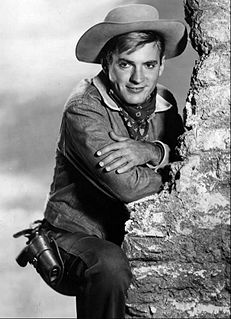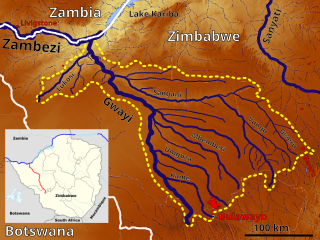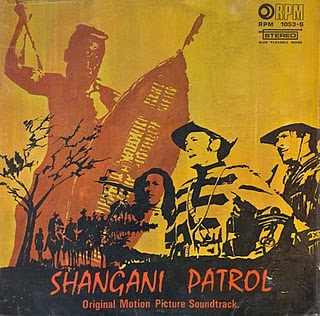
Matabeleland is a region located in southwestern Zimbabwe that is divided into three provinces: Matabeleland North, Bulawayo,and Matabeleland South. These provinces are in the west and south-west of Zimbabwe, between the Limpopo and Zambezi rivers and are further separated from Midlands by the Shangani River in central Zimbabwe. The region is named after its inhabitants, the Ndebele people who were called 'Matabele' by British as they failed to pronounce 'Ma Ndebele'. Other ethnic groups who inhabit parts of Matabeleland include the Tonga, Bakalanga, Venda, Nambya, Khoisan, Xhosa, Sotho, Tswana, and Shangaan. The population of Matabeleland is just over 20% of the Zimbabwe's total.

Will Hutchins is an American actor most noted for playing the lead role of the young lawyer Tom Brewster, in the Western television series Sugarfoot, which aired on ABC from 1957 to 1961 for sixty-nine episodes.

Frederick Russell Burnham DSO was an American scout and world-traveling adventurer. He is known for his service to the British South Africa Company and to the British Army in colonial Africa, and for teaching woodcraft to Robert Baden-Powell in Rhodesia. He helped inspire the founding of the international Scouting Movement.
See also: 1880s in Zimbabwe, 1900 in Zimbabwe and Years in Zimbabwe.

The First Matabele War was fought between 1893 and 1894 in modern day Zimbabwe. It pitted the British South Africa Company against the Ndebele (Matabele) Kingdom. Lobengula, king of the Ndebele, had tried to avoid outright war with the company's pioneers because he and his advisors were mindful of the destructive power of European-produced weapons on traditional Matabele impis attacking in massed ranks. Lobengula reportedly could muster 80,000 spearmen and 20,000 riflemen, armed with Martini-Henry rifles, which were modern arms at that time. However, poor training meant that these were not used effectively.

Allan Wilson was an officer in the Victoria Volunteers. He is best known for his leadership of the Shangani Patrol in the First Matabele War. His death fighting overwhelming odds made him a national hero in Britain and Rhodesia.
Patrick William Forbes (1861–1918) was a leader of the paramilitary British South Africa Police, who commanded a force that invaded Matabeland in the First Matabele War.

Zimbabwe boasts several tourist attractions, located in almost every region of the country. Before the economic changes, much of the tourism for these locations came to the Zimbabwean side but now Zambia benefits from the tourism. The Victoria Falls National Park is also a tourist attraction in this area and is one of the eight main National Parks in Zimbabwe, largest of which is Hwange National Park.

The Shangani is a river in Zimbabwe that starts near Gweru, Gweru River being one of its main tributaries' and goes through Midlands and Matabeleland North provinces. It empties into the Gwayi River.

Shangani Patrol is a war film based upon the non-fiction book A Time to Die by Robert Cary (1968), and the historical accounts of the Shangani Patrol, with Brian O'Shaughnessy as Major Allan Wilson and Will Hutchins as the lead Scout Frederick Russell Burnham. Also includes the song "Shangani Patrol" by Nick Taylor.

Texas Jack Jr.,, who adopted the name of his rescuer Texas Jack Omohundro, is best known for running a Wild West show and circus where he gave Will Rogers his start as an entertainer.

Shangani District is a district in the southeastern Banaadir region of Somalia. It lies in central Mogadishu. Shingani along with Hamar Weyne are the oldest districts in Mogadishu.

The Shangani Patrol was a 34-soldier unit of the British South Africa Company that in 1893 was ambushed and annihilated by more than 3,000 Matabele warriors in pre-Southern Rhodesia, during the First Matabele War. Headed by Major Allan Wilson, the patrol was attacked just north of the Shangani River in Matabeleland, Rhodesia. Its dramatic last stand, sometimes called "Wilson's Last Stand", achieved a prominent place in the British public imagination and, subsequently, in Rhodesian history, similarly to events such as the Battle of the Little Bighorn in the United States, the Battle of Shiroyama in Japan, the Battle of the Alamo in Texas, and the Greeks' last stand at Thermopylae.

Shangani Patrol is the soundtrack to the 1970 film Shangani Patrol. It was released in 1970 and was performed by the RPM Studio Orchestra, composed and conducted by Mike Hankinson, and recorded in RPM Studios Johannesburg, South Africa, by Geoff Tucker. Conducted by the composer Michael Hankinson with a session orchestra. A notable member of this group of musicians was trumpeter Eddie Calvert - also known in England as "The man with the golden horn". Part of the proceeds from the sale of this album were donated to Brandwag Fund/Fond comforts for border troops. The film was based on the true story of the Shangani Patrol.

Public holidays in Rhodesia, a historical region in southern Africa equivalent to today's Zimbabwe and Zambia—formerly Southern and Northern Rhodesia, respectively—were largely based around milestones in the region's short history. Annual holidays marked various aspects of the arrival of white people during the 1880s and 1890s, as well as the respective unilateral declarations of independence (1965) and of republican government (1970). On these days, most businesses and non-essential services closed. A number of Christian holidays were also observed according to custom, in the traditional British manner, and referred to in official documents by name—Christmas Day, for example, or Easter Monday.

Major Wilson's Last Stand is an 1899 British silent short war film based upon the historical accounts of the Shangani Patrol. The film was adapted from Savage South Africa, a stage show depicting scenes from both the First Matabele War and the Second Matabele War which opened at the Empress Theatre, Earls Courte, on 8 May 1899. It was taken on the field by Joseph Rosenthal for the Warwick Trading Co., Ltd. Copies of this short film originally sold for £3.
Ian Yule is a British born South African actor and former soldier. He had a film career that commenced in the late 1960s and lasted to around the early to mid 2000s. Many of the roles he has played are that of a soldier. The films he has appeared in include Killer Force, in 1976, One Way also released in 1976, Golden Rendezvous in 1977, The Wild Geese in 1978, Safari 3000 in 1982, City of Blood in 1983, and many more. He was also a stuntman in a few films. He also was a screenwriter and wrote some screen plays including Shamwari in which he starred opposite Ken Gampu. He was a well known actor in South Africa.
David Millin was a South African film director, cinematographer and film producer. He has produced various Afrikaans and English films about his career. He has been a member of the American Society of Cinematographers since 1972, the first member of Africa belonging to the organization. In 1994 he was honored by M-Net for his lifetime contribution to the industry and in 1997 he was also honored by SASC / Kodak for his contribution. He was famous for his spectacular depictions, large war scenes and his dry sense of humor.
Zimbabwe has an active film culture that includes films made in Zimbabwe during its pre- and post-colonial periods. Economic crisis and political crisis have been features of the industry. A publication from the 1980s counted 14 cinemas in Zimbabwe's capital city, Harare. According to a 1998 report only 15 percent of the population had been to a cinema. European and American films have been made on location in Zimbabwe as well as Indian films. American films are popular in Zimbabwe but face restrictions limiting their distribution.













